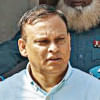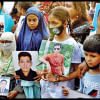Enforced disappearance: Order came from AL govt high-ups

"Certain agencies have gotten panic-stricken because of our investigation. We want to tell them not to be afraid. If someone from a law enforcement agency or an intelligence agency was involved with enforced disappearance, it was entirely their own personal liability. No agency should own them, or their crimes."
The order to carry out enforced disappearances during the ousted Awami League government tenure came from the very top, and the perpetrators will be brought to justice, even in their absentia if necessary, the Commission of Enquiry on Enforced Disappearances said yesterday.
"We found that the highest level of the government was involved in committing this crime," commission Chairperson Justice Moyeenul Islam Chowdhury told reporters at the commission office in Dhaka.
Replying to a query, he said Sheikh Hasina's adviser Tarique Ahmed Siddique was involved in ordering enforced disappearance and they have evidence to that end.
The commission has interviewed 45 members of law enforcement and intelligence agencies, and identified a good number of law enforcers and intelligence officers involved in carrying out enforced disappearances, he said, without disclosing any names.
"Some people are apprehensive because we are finding involvement of some individuals in enforced disappearances, and the entire force is becoming panic-stricken. We want to tell them that the individuals belonging to law enforcement units or intelligence agencies who were involved have to take personal criminal responsibility for their crimes," he said.
He also warned against "community shielding" of perpetrators, saying that criminals sometimes hide behind the collective identity of their community, social group or religion.
"This is called identity-based defence or community shielding. But a person is not tried based on their collective identity, but rather based on specific evidence. Criminal liability is an individual responsibility. There is no scope to accuse an entire community for the crime."
During Sheikh Hasina's 15-year rule, hundreds of opposition leaders, rights activists, journalists, and other professionals critical of the government simply disappeared. Although some returned home or were later sent to jail in trumped up charges after brutal torture, many never made it back home.
Talking about the victims of enforced disappearance who are still missing, Justice Moyeenul said the likelihood of their still being alive is minimal.
Currently, there are 330 cases of enforced disappearances involving individuals who have not returned, and the commission is looking for them, he said.
The commission is now inspecting records from India to determine if any of them are in Indian prisons or elsewhere, the commission chief said.
"We have received a list of 1,067 Bangladeshis incarcerated in Indian prisons over the last two to two-and-a-half years. We are checking if any of them were victims of enforced disappearance."
The commission has also received a list of 140 individuals who were pushed into Bangladesh from Indian territory since the fall of the Awami League on August 5, 2024. An initial investigation into the list did not find any victims of enforced disappearance, but further investigation is underway.
However, Justice Moyeenul noted that one individual, Mohammad Rahmatullah who was "picked up by Rab" on August 29, 2023, was allegedly pushed into Bangladesh through the Chapainawabganj border in December.
The commission has so far received 1,752 complaints of enforced disappearances and has investigated 1,000 of them.
It has found secret detention centres run by Directorate General of Forces Intelligence, the police's Counter Terrorism and Transnational Crime unit and Rab in Dhaka, Bogura, Narayanganj, Rajshahi, Chattogram and several other districts. The commission did not disclose the exact number of the sites.
"We found one centre inside the police lines in Bogura that was specially built over the last decade," Nur Khan Liton, a member of the commission, told the press conference.
Commission members Justice Md Farid Ahmed Shibli, rights activist Sazzad Hossain and researcher Nabila Idris were also present at the event.
Speaking about the about the update on the arrest warrants for 12 individuals, including six former heads of the DGFI, former police IGP and Rab chief Benazir Ahmed and former DIG and counter terrorism head Md Asaduzzaman, Justice Moyeenul said, "If they cannot be arrested, they will be tried in absentia."
The arrest warrant was issued on January 6, but the police have not been able to arrest them yet. The Anti-Corruption Commission raided the home of one ex-DGFI chief, Lt Gen Saiful Alam on February 27, but did not find him.
Commission member Nabila Idris said that officers have told the commission that they acted on orders from high-ups in the previous government. However, the current government has a mandate to investigate and ensure justice for the victims of enforced disappearances.
"So, those who are now helping generals escape are not acting on the orders of superiors. This is your individual responsibility, and you are perpetuating the cycle of crime," she said.
The commission once again pointed out they had ordered the DGFI and Rab to stop the destruction of evidence that had happened post-August 5 at the secret detention centres housed in their respective headquarters, namely Joint Interrogation Cell and Taskforce for Interrogation centre.
Asked if they are taking action against those who had tried to impede the investigation by destroying evidence, the commission said that determining who should bear the responsibility remains a matter of enquiry.

 For all latest news, follow The Daily Star's Google News channel.
For all latest news, follow The Daily Star's Google News channel. 








Comments